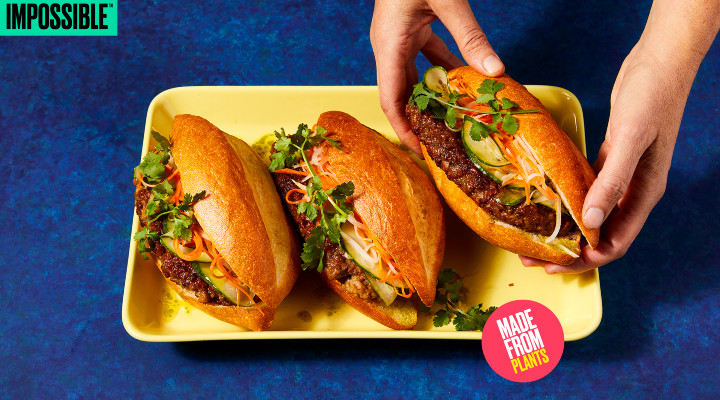Since it debuted its first product, the Impossible Burger back in 2016, Impossible Foods has been on a mission to restore biodiversity and reduce the impact of climate change by transforming the global food system. In 2020, it released its second product, the Impossible Sausage Made From Plants, and it’s just getting started. “So far in 2022, we’ve seen a nearly 70 per cent increase in retail sales. Our market share is up almost 6 per cent compared to a year ago, from roughly 9 share point
points to 14,” Laurent Stévenart, Singapore’s country manager for Impossible Foods, told Inside Retail.
“With an unrivalled foundation in [research and development], Impossible is the first company delivering on the promise to make meat from plants that consumers actually prefer over the animal version,” he said, citing surveys the company has conducted.
He went on to explain that the company is on a mission to transform the global food system and reduce the impact of climate change by making the world’s most delicious, nutritious, and sustainable chicken, pork and beef products from plants.
“This will have a profound impact on the global food system: both in its direct environmental impact and its ability to feed the growing global population,” he added.
Laurent Stévenart, Singapore’s country manager for Impossible Foods
The current state of affairs
The company debuted Impossible Pork Made From Plants at more than a hundred restaurants in Hong Kong and Singapore in the fall of 2021. Some of the restaurants offering Impossible Pork include Good Burger, Da Paolo, Privé, Three Buns and Tasty Loong.
More recently, the company launched Impossible Beef Made From Plants in two preformed, quarter-pound patties made for cooking at home.
“Burger patties are so simple and fast to cook at home and Impossible Burger Patty Made From Plants allows home chefs to create a classic-style burger or a juicy patty melt, in just four minutes,” Stévenart noted.
Earlier this month, in the US, the company launched Impossible Bowls, a new lineup of plant-based frozen meals that can be ready in minutes. Each one contains 10-13 grams of protein, 3 grams or less of saturated fat and zero cholesterol and trans-fat.
“The plant-based proteins featured in Impossible Bowls are also better for the planet: chicken and pork in each entree accounts for less water consumption, land use and greenhouse gas emissions than their animal protein counterparts,” he stated.
Impossible Bowls are just one of several new products the company has launched recently, coming on the heels of its US rollout of Impossible Chicken Patties in August, Impossible Sausage Links in March and Impossible Sausage Patties and Impossible Wild Nuggies in February.
Stévenart believes the company’s greatest strength lies in its ability to convince meat-loving consumers that plant-based products can taste as good as – or even better than – the animal version.
The Singapore market
While a 2021 study by Kantar revealed that Impossible Foods is not the most well-known plant based brand among Singaporean consumers, Stévenart believes awareness is growing.
“We have seen a steady growth in consumer awareness and interest from local consumers, with 74 per cent total brand awareness, up by more than 30 per cent YoY,” he stressed.
The company’s products are now sold in more than 700 restaurants in Singapore, which is a nearly 300 per cent increase since January 2020.
“In addition, Impossible Beef is also now available at nearly 80 NTUC FairPrice stores and about 40 Dairy Farm group stores (Cold Storage, Market Place, Giant),” he said.
It’s also available in RedMart stores – Singapore’s biggest online grocer – and via Amazon. The company’s Impossible Bowls are only available in the US at the moment, and there are no plans to roll them out to overseas markets yet.
The future is bright
Stévenart is bullish about the future of the brand, and the company is positioned to make greater inroads into Asia.
“We’ve got a lot of exciting growth planned for 2022 and beyond. We can’t share many details at this time, but I will say that Asia is by far the number one focus for our growth strategy,” he added.
Forty-four per cent of the world’s demand for meat comes from Asia, and the market is expected to grow at a rate of 70 per cent over the next couple of decades, faster than anywhere else in the world. But demand for plant-based meat is also growing.
“We’ve seen high adoption in Hong Kong, Macau, and Singapore which is quite encouraging for when we expand throughout Asia,” he stated.
He said the company’s overall mission is to make its products as accessible, available and affordable as meat from animals.
“To achieve this, we need to launch in new markets, launch new products and rapidly expand our manufacturing. There’s a ton of exciting stuff coming this and next year – stay tuned,” he concluded.

